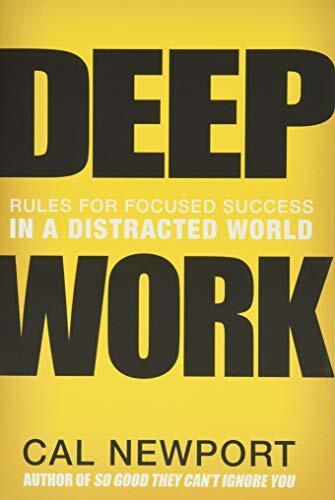
This isn’t really a book report. I asked the author of the book by the same name to join me on my podcast but his people said he was too busy. Fine. I’ll go it alone.
Deep work is sometimes referred to as “flow”. As-in being in the flow. Being in the zone. A state where you are deep in thought and unaware of anything outside your thoughts.
Most of have lost our ability to have a sustained period of deep thought.
I think it started when the newspaper USA Today first came out in 1982. USA Today was pretty notable for making news in easy to digest snippets. Lots of pie charts so you can understand things quickly. Concise news reporting is what they call it.
I’m not saying that USA Today made us lose our ability to sustain our concentration. It’s a chicken and egg situation. Which came first?
There are many examples of the human population not wanting to concentrate for long. Snapchat, Instagram, TicTok. Sure, we can all sit there and be captivated by any one of these for an hour or so. We can continually watch numerous brief kitten videos for an hour. That’s not really concentrating. That’s vegging.
We are also very accustomed to operating in a disruptive environment. Emails, texts, alerts, people walking into your office unannounced. Some people think “multi-tasking” is a solution. Sometimes it’s the only choice. Only we aren’t really multi-tasking. We are working on one thing and then another and then another. It always takes time to switch from one thing to another. So, we lose time.
Yes, sometimes we CAN actually multi-task. We can brush our teeth and listen to the news. We can talk on the phone and tie our shoes. But we can’t actually write a proposal and review a report at the same time. We do one and then we do the other.
At some time or another we can all benefit from having sustained periods of time when we concentrate deeply. If we are writing a technical paper, for example. Or if you are trying to solve a particularly complex problem.
The book I mentioned discusses numerous approaches to improve our ability to sustain concentration. I’ll give you alternative advice.
Baby steps. Because we aren’t used to it. We are used to being distracted and to having only very brief periods of thought.
Set a timer. Five or 10 minutes. Baby steps, remember? Do your work. Do not check your social media. Turn off your email and whatever other notifications you get. Put your cell phone in airplane more. Do not fiddle with things on your desk. Do deep work. Only deep work. When the timer goes off reward yourself for a few minutes of social media or make yourself a cup of coffee, whatever distractions make you happy.
The brain is like a muscle. If it isn’t used to doing this, you need to use this slowly. Just like when you go to the gym after a long layoff. You can’t expect to go back and bench 200 pounds.
So, 10 minutes, take a break, lather, rinse and repeat.
It may help to listen to music that is designed to help sustain concentration. It can help to drive out distractions. Not normal music. There is a lot of research that goes into making music for concentration. No human voices. No brass horns. There are a few platforms that provide this. There are a lot of free providers. See if headphones help.
You can do it. Concentration.

